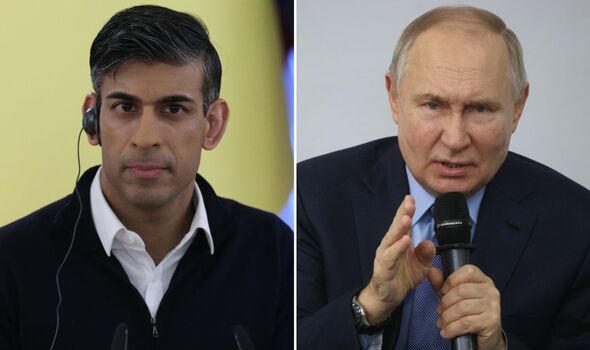Britain is sending 20,000 sailors, soldiers and aviators close to Russia’s borders in Nato’s biggest military exercise since the Cold War.
Grant Shapps will issue a stark warning about the need for hard-headed realism in an increasingly dangerous world in a major speech today.
The Defence Secretary will warn battle lines are being redrawn as he announces the UK’s contribution to alliance wargaming that will send a clear message to Vladimir Putin about the West’s unwavering response to his invasion of Ukraine.
Mr Shapps will say: “We are in a new era and we must be prepared to deter our enemies, prepared to lead our allies and prepared to defend our nation whenever the call comes.”
“Today our adversaries are busily rebuilding their barriers. Old enemies are reanimated. Battle lines are being redrawn. The tanks are literally on Ukraine’s lawn. And the foundations of the world order are being shaken to their core. We stand at a crossroads.”
“I can announce today that the UK will be sending some 20,000 personnel to take part in one of Nato’s largest deployments since the end of the Cold War. Exercise Steadfast Defender. “
“It will see our military joining forces with counterparts from 30 Nato countries plus Sweden, providing vital reassurance against the Putin menace.”
In an address at Lancaster House, Mr Shapps will set out his vision for deterring threats, leading among allies, and defending the UK.
Within months, 20,000 service personnel from the Royal Navy, the British Army, and the Royal Air Force will take part in Exercise Steadfast Defender 24.
It will be the largest deployment of land forces to Nato since 1984.
The UK’s armed forces will join thousands of personnel from more than 30 allies operating across multiple countries.
They will carry out exercises across the North Atlantic, Baltic, Norwegian Sea, Arctic Circle and in Eastern Europe.
Some 16,000 troops with tanks, artillery and helicopters will be deployed from the British Army across eastern Europe starting next month as part of the exercise.
The Royal Navy will deploy more than 2,000 sailors across eight warships and submarines, while more than 400 Royal Marines Commandos will be sent to the Arctic Circle.
The RAF will use F-35B Lightning attack aircraft and Poseidon P-8 surveillance aircraft.
Defence sources said that the exercise will prepare for the invasion of any aggressor into a member state under the principle of “collective defence”.
Mr Shapps gives the address just days after the UK joined the United States in carrying out targeted airstrikes against Houthi rebels in Yemen.
It is understood that he will encourage allies to put defence on a new footing following the end of the so-called peace dividend that saw spending drop following the fall of the iron curtain.
The Defence Secretary wants to ensure that support for Ukraine remains steadfast until the end as Putin continues his war of attrition.
Rishi Sunak made a surprise visit to Kyiv on Friday to announce £2.5 billion in military aid for Ukraine this year, up £200 million on previous packages.
The Prime Minister also signed a new security partnership with Ukrainian president Volodymyr Zelensky as he hailed the “unbreakable alliance” between the nations.
More than 500 drones and missiles were fired on Ukraine between December 29 and January 2.
But there have been concerns that global focus on the war has shifted following the crisis in the Middle East.
Mr Sunak admitted international demands are becoming more “challenging” but insisted the UK is able to respond.
“My job is to make sure the British people are safe. Can we afford to do these things? We can’t afford not to,” he told a Sunday newspaper.
“It is also about economic security, because of the impact of the Red Sea attacks on the prices people pay at home. We have already seen that in the impact on oil prices of the Russian invasion of Ukraine.”
He added: ‘It is very telling that these things have happened at the same time. That is illustrative of the world we are living in. I think the world is probably the most unstable it has been in decades.”
“The Houthis have significantly increased their attacks on commercial shipping in the past month, and that has put lives at risk.”


